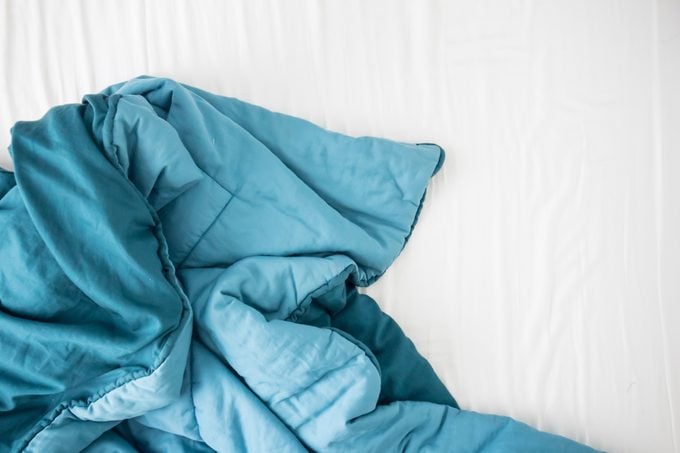5 Things Doctors Need You to Know About Weighted Blankets
Updated: Apr. 27, 2021
Doctors reveal what they want you to know about weighted blankets and their potential to reduce anxiety and promote overall well-being.
You may find comfort in a warm hug. This is exactly what a weighted blanket feels like when you snuggle underneath. “A weighted blanket stimulates deep pressure touch, almost like you’d get from a massage,” says Georgine Nanos, MD, MPH, a family physician and CEO of Kind Health Group in Encinitas, California. That can give you a sense of well-being.
But, these therapeutic blankets do more than just keep you cozy and snug. Weighted blankets have become popular due to their promise in improving sleep, reducing anxiety, and even calming or comforting those with autism.
This has led sales to skyrocket. Gravity Blankets, developers of the first weighted blankets for the general public, sold more than 60,000 blankets for $15 million in sales by late 2018.
So, is it worth the hype? Unlike some products that claim to be “stress relievers” (bath bombs), there is some science behind the use of weighted blankets for mental health.
Here’s what our mental health experts want you to know about these therapeutic blankets and their effectiveness. (Here are therapists’ top tips to deal with anxiety.)
Reducing anxiety
Wrapping yourself up in a weighted blanket triggers your body’s natural stress reduction hormones, including serotonin and oxytocin (known as the “cuddle chemical”), says Jennifer Dragonette, PsyD, a psychologist and executive director with Newport Academy in the San Francisco Bay area. Surges in these hormones may feel calming and soothing, Dragonette says.
Science agrees. A 2012 study in the Journal of Medical and Biological Engineering found that weighted blankets can activate the parasympathetic nervous system, the part of your nervous system that tells your body to essentially “chill out” and counteract stress. Furthermore, a small study in the journal Occupational Therapy in Mental Health found a 30-pound weighted blanket is a safe and effective way to reduce anxiety in adults. Out of a total of 32 adults, 20 reported lower anxiety after use.
The size of your blanket will depend on your own weight (more on that later).
It’s important to remember there are limitations to these blankets. If anxiety is impacting your ability to do the things you used to do, then seek professional help from a certified therapist. Think of blankets more as one way to help you feel comforted and supported, but not the only one, says Dragonette. (Here are the 10 best weighted blankets according to Amazon reviews.)
 Improving sleep
Improving sleep
Do you toss and turn in the middle of the night? A weighted blanket may help with insomnia and other sleep disorders. A small 2015 study in the Journal of Sleep Medicine & Disorders on 30 people with insomnia found that those who used weighted blankets slept longer at night and moved less while they slept. They also found the blankets to be comforting. (Note: The study was funded by the company that made the weighted blankets, so take it with a grain of salt.)
However, more research needs to be done. “The reality is that we just don’t have any solid data one way or another on whether weighted blankets are an evidence-based treatment for insomnia,” says Shelby Harris, PsyD, clinical psychologist in private practice in Westchester, New York and author of The Woman’s Guide to Overcoming Insomnia. The issue is that all weighted blankets are different. While you can buy them at specific weights, they will be made with different materials and sizes (also more on that later).
Consequently, some people might feel hot under one of these, adds Harris, which can interfere with sleep. Another limitation is that if you get used to sleeping under a weighted blanket, you won’t have it available to you when you travel. This makes it even harder to get good sleep at another destination, she says. (Here are other sleep aids that could hurt your slumber.)
Providing comfort for autism
Children with certain conditions, such as autism, may experience trouble sleeping. The use of deep pressure therapy from weighted blankets to improve sleep quality among these children is limited. A small 2014 study of 76 children, published in Pediatrics, found those with autism saw little improvement in their sleep scores. However, both the children and their parents reported liking the weighted blanket more than traditional blankets.
“A parent may want to consider weighted blankets for kids with trouble sleeping, especially those who also have anxiety, autism, or even ADHD,” says Neha Chaudhary, MD, child and adolescent psychiatrist at Massachusetts General Hospital and Harvard Medical School and co-founder of Brainstorm, Stanford’s Lab for Mental Health Innovation. She likens this to swaddling a baby. “The pressure of the blanket essentially tells your autonomic nervous system—the system responsible for things like heart rate and breathing—to settle down into a state of rest. This typically helps induce a state of calm that helps kids fall asleep more easily,” says Dr. Chaudhary.
That said, if you’re buying a blanket for a child, it’s important to adhere to the weight and age recommendations on the blanket. One designed for adults would be too heavy for children. (Here’s a look at the 15 silent signs of anxiety in children.)
Promoting feelings of wellness
You don’t need a medical reason to get a weighted blanket. This at-home therapy is intended to provide benefits similar to those from deep pressure therapy, such as well-being. “As humans, we’re engaged so much online, that there’s not a lot of opportunity to feel like you’re encompassed in a deep hug. Ideally, it’s best to get this from a human, but that’s not always possible,” advises Dr. Nanos. (Learn what it’s like using a Bearaby weighted blanket.)
Buying a weighted blanket
After reading the potential benefits of weighted blankets, if you’re still curious about purchasing a weighted blanket, there are certain things to keep in mind. General recommendations are to choose a weighted blanket that is 10 percent of your body weight, says Harris. (If you are 150 pounds, that means looking for one around 15 pounds.)
However, it’s not an exact science, as they don’t come in one-pound increments. For instance, you may be able to find those that are 15-, 20- or 25-pounds. Do your best to choose one close enough to the right weight.
Also, keep in mind the fillers and material of your weighted blanket. They usually get their added weight from plastic, glass, or steel pellets. That said, you’ll want to know how to wash a weighted blanket too.
Look for weighted blankets made for children if you’re purchasing for a child. These blankets will be lighter in weight. Do not use these for babies, as it can be dangerous for infants to sleep with any type of blanket, according to the American Academy of Pediatrics. What’s more, for a young child, talk to your child’s pediatrician before sending them to bed with one.
For adults, if you have sleep apnea, a respiratory problem, or other medical condition, ask your doctor if it’s okay to use one, advises Harris. And shop around: These blankets can be expensive. They often cover just a small portion of your bed and may not replace an existing comforter. Also, some offer additional features (made with cooling materials, for instance). Above all else, maintain perspective, says Harris. “If weighted blankets were a solution for everyone’s sleep problems, we’d all be using them by now,” she says.

